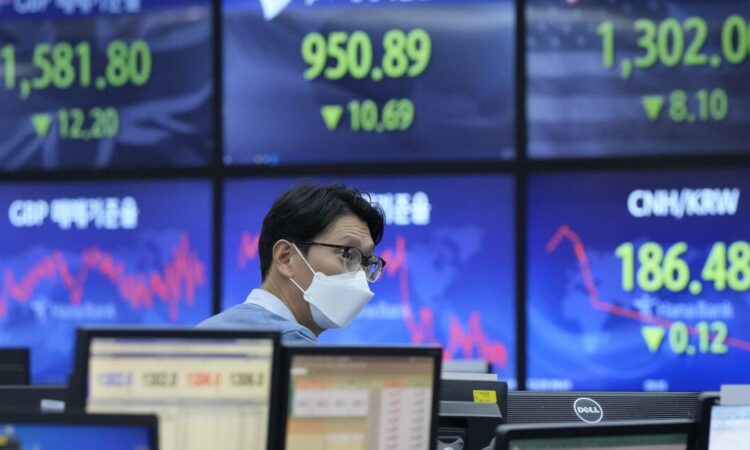
Stocks are drifting on Wall Street, while bond markets around the world feel pain Tuesday after a surprise move from Japan’s central bank cranked up the pressure on an already slowing global economy.
The S&P 500 was 0.4% higher and on pace to break a four-day losing streak after flipping between small losses and gains in morning trading. The Dow Jones industrial average was up 137 points, or 0.4%, at 32,894, as of 10:30 a.m. (Eastern), while the Nasdaq composite was 0.4% higher after erasing an earlier drop of 0.9%.
The biggest action was in the bond market, where yields pushed higher after one of the world’s last bastions of super-low and economy-aiding interest rates made moves that could allow rates to climb more than otherwise.
The Bank of Japan said Tuesday it still wants the yield on 10-year Japanese government bonds to remain at roughly zero, but it also said it would allow the yield to move up to 0.50% instead of the 0.25% cap it had held previously. What made Tokyo’s unexpected move a particular jolt was how much resistance it’s shown so far in joining the global campaign to hike rates in order to undercut high inflation.
“BoJ’s surprise move allowed it to take a small step away from the extreme dovish side of the monetary policy spectrum, where it had stood alone all year among major central banks,” wrote Jennifer Lee of BMO Economics in a note to clients. “It is not joining the rate-hikers out there, but it is now a tad closer.”
Higher yields make borrowing more expensive, which slows the economy while also pushing down on prices for stocks and other investments. Other central banks around the world, particularly in the United States and Europe, have been raising rates at such an explosive clip that a growing number of economists and investors see a recession hitting in 2023. Both the Federal Reserve and European Central Bank have pledged to keep raising rates into next year to be sure the job is done on getting inflation under control.
Aftershocks from the Bank of Japan’s move on Tuesday rippled through bond and currency markets around the world.
In the U.S., the yield on the 10-year Treasury rose to 3.67% from 3.59% late Monday. That yield helps set rates for mortgages and other economy-setting loans, which has already meant particular pain for the U.S. housing market.
A report on Tuesday showed U.S. homebuilders broke ground on fewer homes for a third straight month in November. The number of building permits, meanwhile, fell to its lowest level since June 2020 when the pandemic froze the economy.
The two-year U.S. Treasury yield, which tends to more closely track expectations for action from the Federal Reserve, was more reserved. It gave up earlier gains to hold steady at 4.26%.
In the foreign exchange market, Tokyo’s surprise move sent the value of the Japanese yen climbing against the U.S. dollar, which gave back some of its huge gains over the past year. One dollar now buys 131.86 yen, down 3.7% from a day earlier.
The Nikkei 225 index of Japanese stocks also fell 2.5%.
Stocks worldwide have been under pressure the entire year on worries about high inflation, higher interest rates and a weakening economy.
In Shanghai, stocks lost 1.1% after the World Bank cut its forecast for China’s economic growth this year to 2.7% from its June outlook of 4.3%. The bank cited repeated shutdowns of major cities to fight COVID-19 outbreaks. China now is relaxing some of its anti-COVID restrictions, but worries are rising that resulting breakouts of the virus could mean their own hits to the world’s second-largest economy.
European markets were modestly lower.
On Wall Street, stocks of energy-related companies were leading the way higher as oil prices ticked higher. Halliburton gained 4.2%, and Schlumberger rose 2.8%.
One of the other big worries on Wall Street is that a slowing economy and still-high inflation will mean much weaker profits for U.S. companies, further dragging on their stock prices.
General Mills fell 3.6% despite reporting better profit for its latest quarter than analysts expected. FedEx and Nike will report their own results after trading closes for the day. —-
AP business writers Joe McDonald and Matt Ott contributed to this report.



